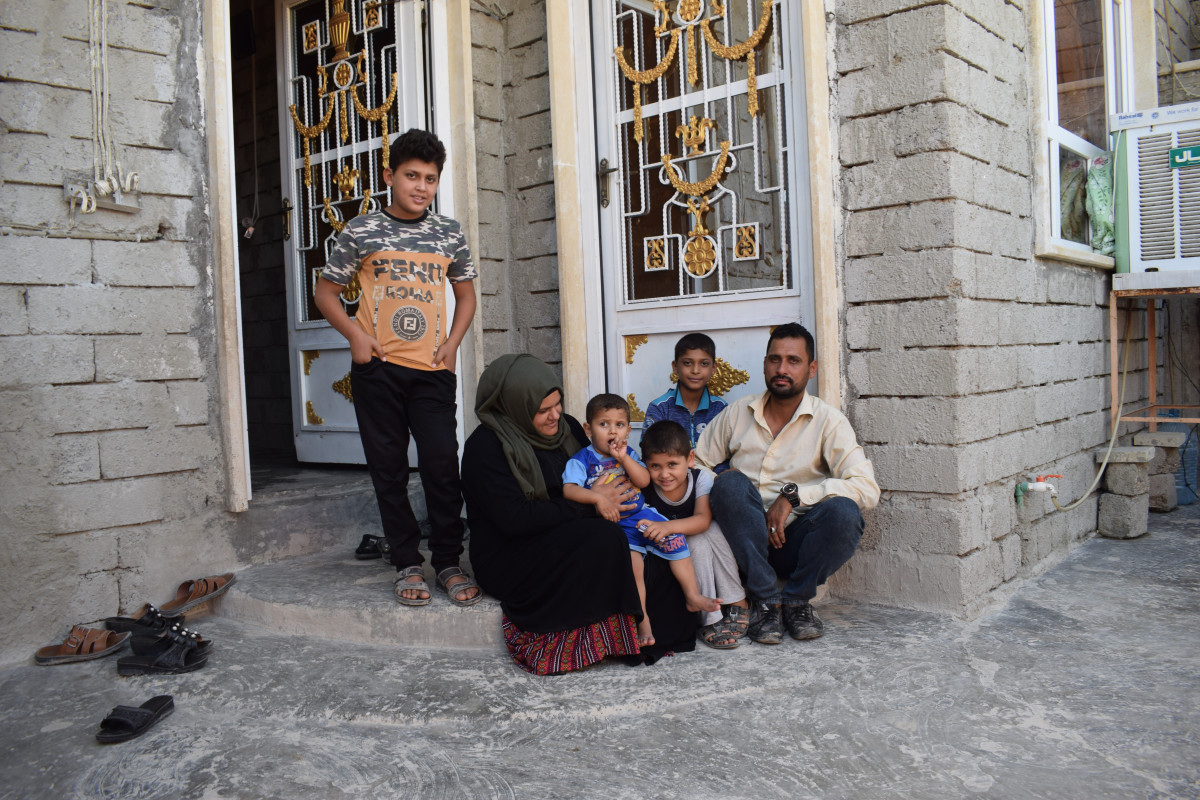‘We can have three meals a day now’: A family in Iraq tastes normalcy through work placement programme
Published: Oct 19, 2020 Reading time: 5 minutes Share: Share an articleIraq is struggling to rebuild itself from the ashes of conflict. As the economy continues to squander since the time of the self-proclaimed called Islamic State (ISIL) rule, families are finding it difficult to find stable sources of income and support themselves. Especially in the city of Mosul, ISIL’s last stronghold, and with the added compound of COVID-19 related restrictions, the economic consequences families face remain devastating.

With funds from the European Union, through the EU Regional Trust Fund in response to the Syrian crisis, the EU Madad Fund and the Czech Republic Development Cooperation, People in Need (PIN) implemented a work placement activity within a livelihoods support project to pair people in the Mosul area with businesses in need of extra assistance.
Both beneficiaries of PIN’s work placement activity, husband and wife Muhammad and Sherifa share with us their daily struggles in finding work – with the additional hurdle of Mohammed’s physical disabilities they both must jump in order to reach stability.
“Since my childhood, I have not been able to hear or speak,” Muhammad, 34 signs to his wife, who acts as an interpreter. “My life has been full of difficulties,” he adds how children used to harass him constantly for being both deaf and mute.
Sitting in their bare cement home in a village near Mosul, Ninewa province, Sherifa, Mohammed’s wife, looks tired. She explains how finding work for Mohammed is difficult, as people misunderstand his disability. But she insists Muhammad is “someone who is ambitious and likes to work a lot.”
With or without this disadvantage, though, securing enough income to provide for their five children proves continuously difficult. Their remote location, the state of the economy in general in Iraq, and now with the COVID-19 pandemic restricting businesses to function as normal, all create pressures for them to meet their daily expenses.
“Muhammad and I used to walk great distances in search of work… until our shoes were torn,” Sherifa explained, because of their great distance and lack of money for transportation.
“We were completely desperate,” she continued. “We were lucky to have only one meal per day for the seven of us. I used to wake up thinking about what I should prepare for my babies to eat! How can they survive like this?”
PIN helped Muhammad secure an opportunity to work at a carwash for two months, where he assisted the shop owner in cleaning and maintenance. After months of searching and intense emotion at each rejection, Sherifa says Muhammad “felt unspeakable joy” upon receiving this work opportunity through the work placement activity. Their children were ecstatic watching their father come home with bags of fruits and vegetables, which they weren’t able to afford before.
Once this work placement opportunity began, “we started to have 3 meals (breakfast, lunch and dinner,) just like any normal family,” Sherifa shares with us, giving a sense of relief.
Muhammad expressed how his employer treated him with dignity and respect, and was an experience like no other. Sherifa called Muhammad’s boss every day to ensure he arrived safely, and relays to us his improved physical and psychological health during this time. “A lot has changed for the better,” she tells us.
This positive experience impacted Sherifa, which motivated her to participate in PIN’s work placement activity herself. When a potential employer called her in for an interview, her and her family were overjoyed. But the same old worries set in as they didn’t even have enough money for the taxi ride there.
“No taxi driver would give us a ride,” she describes. “So we went to the grocery shop and borrowed a small amount of money which finally got me to the interview. No one slept that night,” she adds, as the whole family was restless with anticipation.
For the last three months now, Sherifa has been working as a cleaner at a private school. Every day at 8 AM, Sherifa goes to the school to clean and sanitize the classrooms and prepare breakfast for the teachers before returning to her family in the early afternoon.
When asked what her favourite thing about her new work is, she emphatically describes, “the first step [into the facility], first tear of happiness,” is what she will never forget. “I felt blessed when I stepped in the school. I couldn’t believe that I finally got a job.”
Now, with nearly four months worth of income generated between the two, Muhammad and Sherifa can rest a bit easier and begin to think of things beyond mere survival. “My biggest dream is to have a house with doors and windows, for privacy,” says Sherifa. “I see my future as me and Muhammad surrounded by our 5 children grown, and their schooling completed, and having a job.”
This activity is being conducted as part of the "Supporting Resilience for Host Communities, Returnees, and Internally Displaced Persons in Iraq" project, which is funded by the European Union, through the EU Regional Trust Fund in response to the Syrian crisis, the EU Madad Fund and the Czech Republic Development Cooperation.
The project is implemented by ACTED, PIN, Welthungerhilfe (WHH), and Polish Humanitarian Action. PIN, ACTED, and WHH are members of Alliance2015, a strategic partnership of eight leading European humanitarian and development NGOs that has delivered 202 million euros in aid to Iraq.



